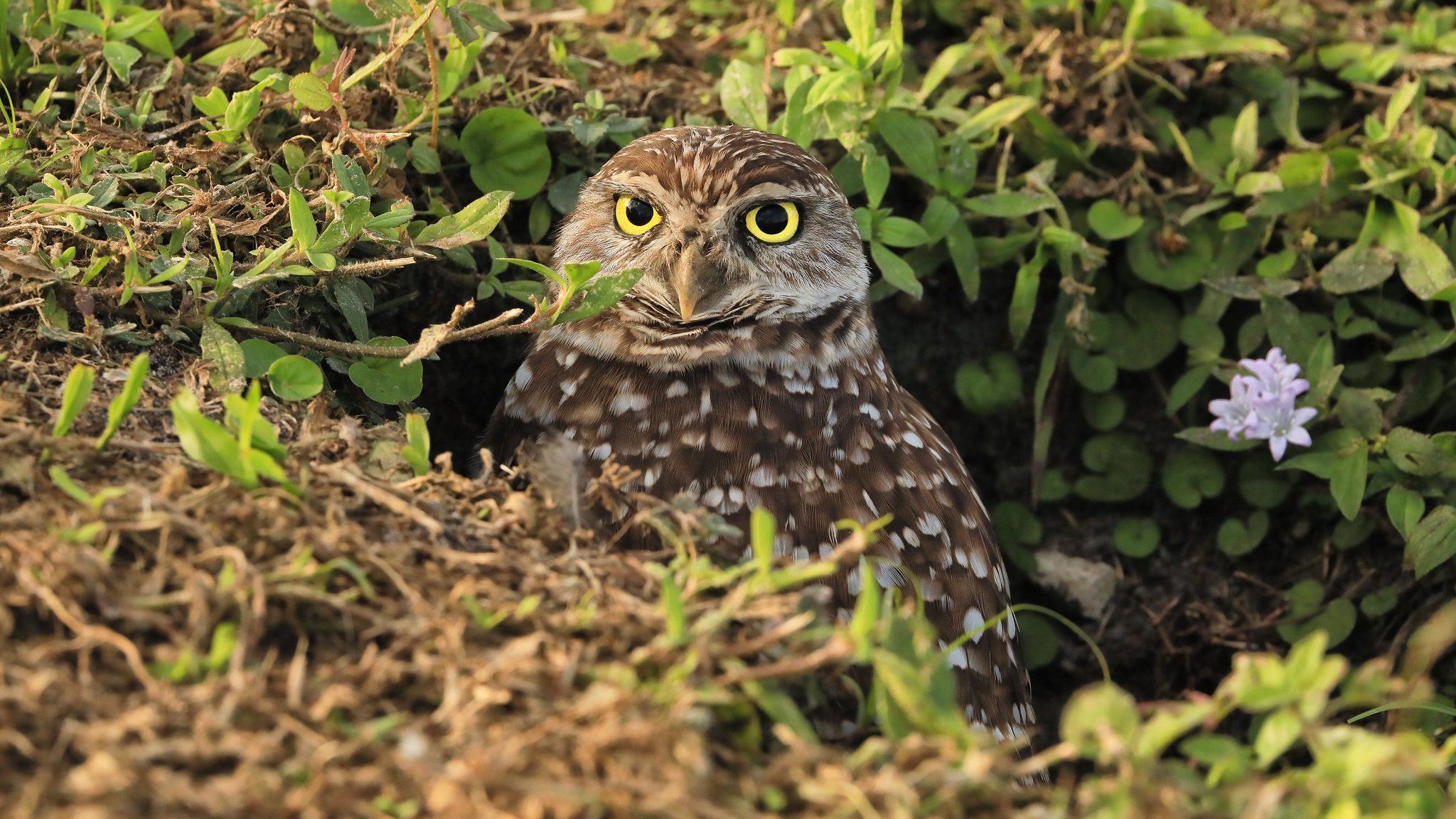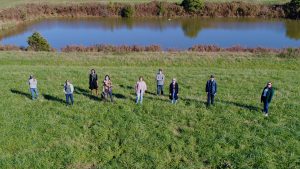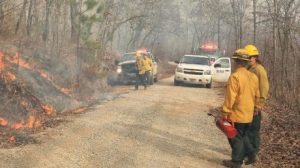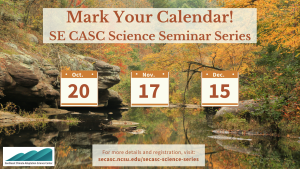A Look Back at SE CASC Activities in 2020

While this year has brought unexpected challenges and a collective “new normal,” the Southeast CASC has continued to develop science products, research opportunities, and outreach events – primarily from our homes! Let’s take a look back at a few of the many accomplishments of 2020 that we’ll be building on in the year ahead.
Publications
We added 40 new publications to our database of peer-reviewed reports and journal articles supported by SE CASC.
A sampling:
– Building adaptive capacity in a coastal region experiencing global change, co-authored by SE CASC Research Ecologist, Mitch Eaton in Ecology and Society, details the social process of adaptation planning in the Lowcountry region of South Carolina. Learn more.
– Risk of bird predation and defoliating insect abundance are greater in urban forest fragments than street trees, by Larry Long (2016-17 Global Change Fellow) and Steve Frank (SE CASC Investigator), concluded that the greater habitat complexity found in small fragments of forests in urban areas provides better habitat for both urban birds and chewing insects than street trees in other urban landscapes. Learn more.
– Range-wide habitat suitability maps for at-risk species in the longleaf system: U.S. Geological Survey data release, by SE CASC researchers, Brian Crawford, John Maerz, and Clint Moore, supports species status assessments for five reptile and amphibian species in their habitat ranges across seven states. Learn more.
– A new paper in Scientific Data, Developing the hydrological dependency structure between streamgage and reservoir networks, by Sudarshana Mukhopadhyay (Spring 2018 Global Change Fellow), with Sankar Arumugam (Faculty Affiliate) and Chandramauli Awasthi (2018-2019 Global Change Fellow), describes development of a new hydrological data tool that helps users make informed decisions about water resource management. Learn more.
Global Change Fellows

This year, the Global Change Fellow’s field intensive was hosted virtually in collaboration with the Auburn NSF Research Trainee (NRT) Program. The Climate Adaptation & Resilience Immersion event brought together 2020-2021 Global Change Fellows, NRT students, and other students from SE CASC Consortium Universities to engage over several priority science topics for the Southeast. Students were able to build collegial relationships, develop an understanding of resource management needs across the Southeast, and become familiar with the mission and principles of the SE CASC over this week-long virtual event.
Our Fellows hosted live-streamed Global Change seminars to prompt informed discussions on various issues related to climate change. The topics included:
– Fire: Connecting Science, Management, and Policy
– Faith and Reasoning in Climate Change Views
– Adaptation to Global Change in Urban Environments
– Climate Policies and COVID-19
– Disaster Recovery During a Global Pandemic
Stay up to date with our Researcher Spotlight series where we highlight student research endeavors and their experience as a Global Change Fellow!
Research
This year our dedicated team of researchers…

– Identified projected changes for potential prescribed burn days in the southeastern United States. Burn events are important for the health of many southeastern forest ecosystems and require an alignment of time, resources, fire specialists, and suitable weather conditions. Climate change is reducing potential “burn windows,” especially in warmer months. Learn more.
– Completed an evaluation of conservation priorities for threatened species that currently occupy overlapping habitat networks in the southeastern United States. This research emphasizes the importance of adopting varying conservation protection measures for different species as climate and land-use change risks increase. Learn more.
– Worked collectively with the North Carolina Institute for Climate Studies to contribute to the North Carolina Climate Science Report which provides a scientific assessment of historical climate trends and potential future climate change in North Carolina under increased greenhouse gas concentrations. Learn more.
– Initiated five new actionable science projects. View 2020 Projects.
Outreach
Science conferences being offered in a virtual format has allowed SE CASC Researchers to participate in the 2020 American Geophysical Union Meeting, the 2021 American Meteorological Society Annual Meeting, and the National Tribal and Indigenous Climate Conference. Former Global Change Fellows were given the opportunity to share their science across the SE CASC Consortium by presenting in Auburn University’s Geosciences Colloquium. Additionally, SE CASC Research Ecologist, Adam Terando and SE CASC Researcher, Jaime Collazo led a National CASC webinar on Climate Adaptation Science to Support Amphibian Conservation in the U.S. Caribbean.
We have hosted and participated in a variety of webinar series this year, including:
– NCA4 Webinar Series
– SE CASC & South Atlantic Spring/Summer Science Series
– SE CASC Science Seminar Series
– Climate-Conscious NC – Community Conversations About Climate Change and Climate-Related Extreme Hazards
These events allowed us to share our science with research and management communities throughout the Southeast and collaborate with partners and stakeholders.
A Look Ahead to 2021
- We’ll be kicking off our Spring SE CASC Science Seminar series in February, highlighting SE CASC funded science projects across the Southeast.
- New research projects will be initiated, implementing themes described in Science Priorities and Principles of Operation for the SE CASC.
- Nominations are being accepted from Faculty Affiliates for our 2021-2022 cohort of Global Change Fellows. More information.
- Our Global Change Fellows will plan and host several Global Change Seminars in the spring semester. Stay tuned for announcements.
In addition to visiting our website, you can stay informed about SE CASC related news and events by following us on Twitter @se_casc and subscribing to our newsletter.
- Categories:
